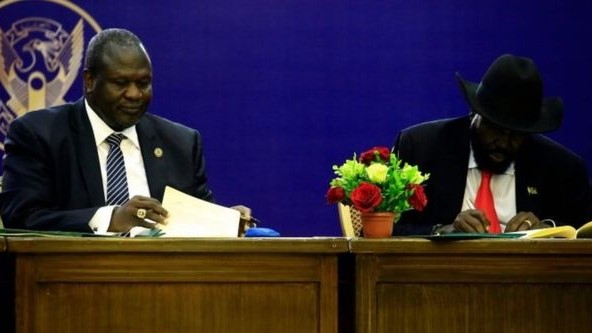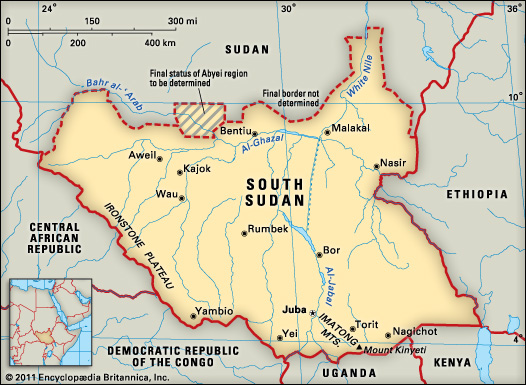Peace for South Sudan
August 6, 2018 | Expert Insights

South Sudan's government reached a power-sharing agreement with the country's main rebel group on 5th August.
Background
Sudan was once one of the largest countries in Africa. It is also a region that is geographically diverse and is rich in resources such as petroleum, iron ore, copper, zinc, silver, gold, hydropower and more. But through the decades the region is plagued by problems. Since becoming politically independent in 1956, proxy wars took place between Sudan, Chad and Libya which caused instability. In the 1980's, there was widespread famine. The first civil war ended in 1972 but the second war began in 1983. During this period, reportedly four million were displaced and two million died. Thus, the region came to be increasingly militarized. However, the worst was still yet to come.
South Sudan is a landlocked country in East-Central Africa. The country gained its independence from Sudan in 2011, making it the newest country with widespread recognition. Its capital and largest city is Juba. South Sudan has suffered ethnic violence and has been in a civil war since 2013. In December 2013, a political power struggle broke out between President Kiir and his former deputy Riek Machar, as the president accused Machar and ten others of attempting a coup d'état. The two have been at the opposite ends of warring factions ever since. The resulting conflict has caused the deaths of hundreds of thousands of people and millions have been displaced.
It should be noted that there have been multiple attempts in the past to negotiate for peace in the region. However, multiple peace treaties have not rendered fruitful results thus far. In 2016, Machar was briefly made the Vice President of the country, but peace was short-lived. Violent fighting ensued, and he fled South Sudan in 2016. Machar has been held under house arrest in South Africa since late 2016. Earlier in July, the two leaders preliminarily agreed to the power-sharing arrangement but 12 hours later, fighting resumed.

Analysis
The president of South Sudan, Mr. Salva Kiir and head of the country’s main rebel group, Riek Machar signed a final ceasefire and power-sharing agreement on Sunday and hailed a new longed-for era of peace in the country.“ I call on everyone as a leader of South Sudan that this agreement which we have signed today should be the end of the war and the conflict in our country,” said President Salva Kiir.
South Sudan’s former vice president and rebel leader Riek Machar said after the signing, “today we celebrate, not just in South Sudan, but throughout the world.” “An agreement on outstanding issues has been signed and this agreement expresses the commitment of all parties to a ceasefire,” the foreign minister of neighbouring Sudan, Al-Dirdiri Mohamed said.
The peace deal that was signed on Sunday is the 12th ceasefire and second power-sharing agreement. The power-sharing deal stipulates that there will be 35 ministers in the bloated transitional government, including 20 Kiir allies and nine backers of Machar, along with representatives of other rebel factions.
Sudan helped broker the agreement. Sudan’s president Omar al-Bashir said on Sunday oil would be pumped from South Sudan’s Wahda region to Sudan beginning September 1.“There will be profit brother Salva ... one of our goals is the need to save the economy of South Sudan because it has reached a level of collapse,” he said.
On Friday, Kiir said he believed the new peace deal between his government and the main rebel group would not collapse because it was not forced upon them like previous accords. He blamed the failure of earlier accords on foreign influence. “We must accept that the internal war has no meaning and has imposed suffering on us and our families and has killed hundreds of our young men and women, destroyed our economy, and left us divided” Kiir said. He urged dialogue with the UNSC on how to secure the region from threats and keep the peace.
Mr. Machar urged the regional East African bloc Intergovernmental Authority on Development (IGAD), which is pushing the latest peace talks, to ensure that the deal is implemented. "I want IGAD to focus on the implementation of the deal because devil lies always in the implementation," he said in his address.
Counterpoint
Washington has been sceptical about the success of the latest peace initiative, given the fiery enmity between Kiir and Machar. Last month the White House warned that "a narrow agreement between elites" would not solve the problems plaguing South Sudan." "In fact, such an agreement may sow the seeds of another cycle of conflict," it said.
Assessment
Our assessment is that the final peace accord deal in South Sudan will witness Mr. Machar’s return to a unity government as the first of five vice presidents. Although both Mr. Kiir and Mr. Machar are optimistic that this time around the ceasefire will hold, we feel that the leaders must also consider a multilayered peacemaking intervention that moves beyond just brokering a power-sharing deal. We believe that the conflict in South Sudan has drained its economy and left it in shambles, thus the transitional government must work towards measures that uplift the economy.








Comments